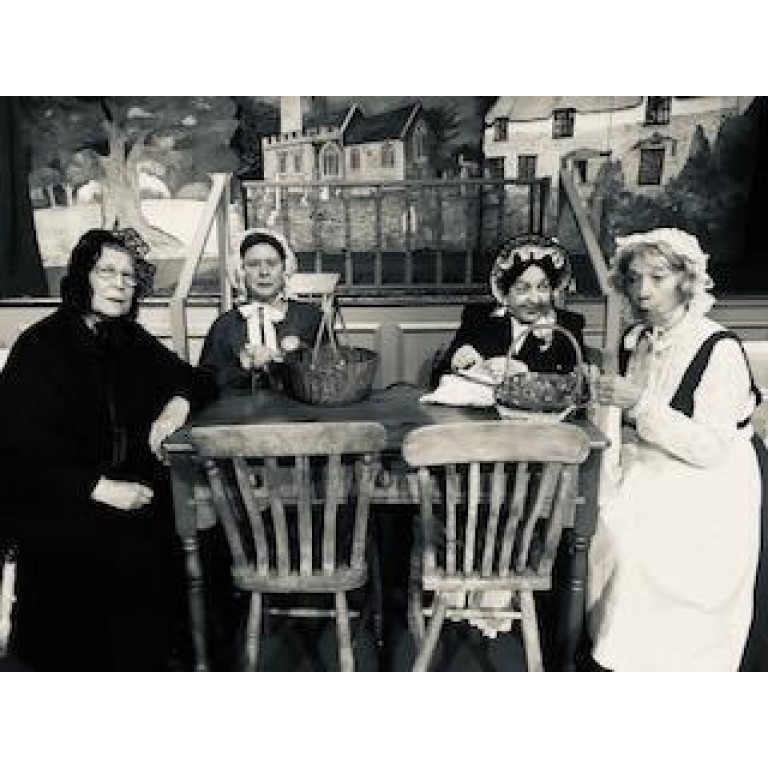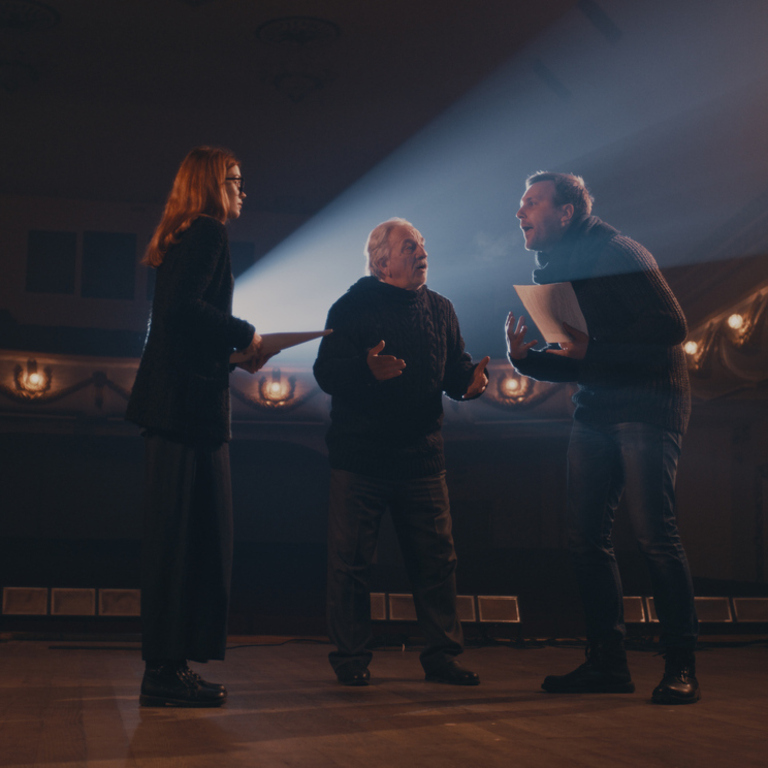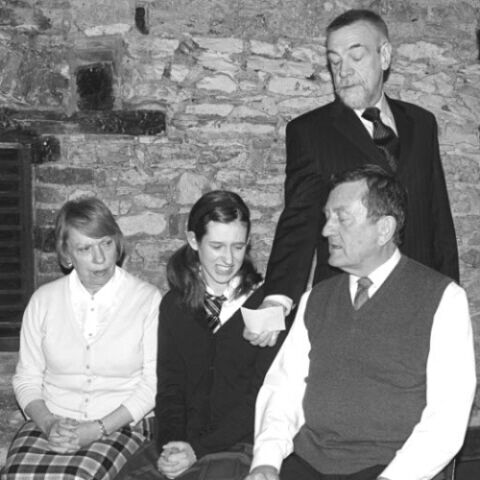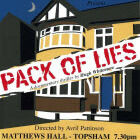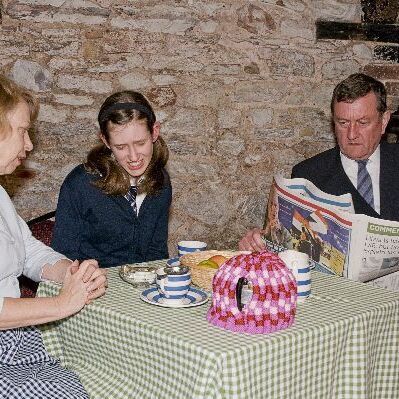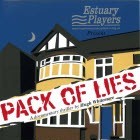
posted 24th July 2025
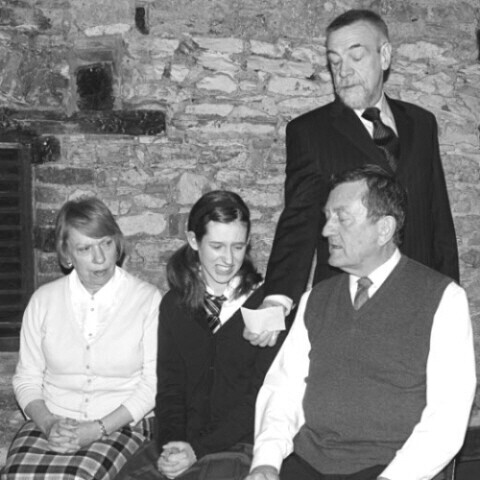
Pack of Lies is a 1983 play by English writer Hugh Whitemore, itself adapted from his Act of Betrayal, an episode of the BBC anthology series Play of the Month transmitted in 1971.
Based on a true story, the plot centres on Bob and Barbara Jackson (in real life Bill and Ruth Search) and their teenage daughter Julie (in real life Gay Search, later a television reporter and newspaper journalist in the UK). The Jacksons are friendly with their neighbours, Peter and Helen Kroger, until the couple are arrested and charged with espionage in 1961. It is revealed the Krogers actually are Morris and Lona Cohen, who during the 1950s and 1960s worked with fellow spy Gordon Lonsdale (real name Konon Molody) photographing and encoding as microdots various pieces of material which they then sent to their colleagues in Russia, as part of a Soviet espionage network known as the Portland spy ring, which had penetrated Britain's Royal Navy.
Cast and Crew
Barbara..........Chris Eilbeck
Bob, her husband..........Howard Eilbeck
Julie, their daughter..........Roslyn Mitchell
Stewart..........Alan Caig
Helen.........Maggie Bourgein
Peter, her husband..........Bill Pattinson
Thelma..........Maggie Butt
Sally..........Anny Kilbourne
Director..........Avril Pattinson
Assistant Director/Prompt..........Janine Warre
Production Manager..........Chris Williams
Stage Manager..........Freddie Jacobs
Lighting..........Peter Tapp
Sound..........John Bradley, Maggie Bourgein
Props..........Cally Pettit, Rosie Munns, Freddie Jacobs
Wardrobe Co-ordinator..........Janine Warre
Set construction..........Eliot Wright, John Bradley, Tom Epton
Publicity..........Maggie Butt, Angela Wallwork, Rose Gander, Alan Caig
Website..........Des Gander
Poster..........Phil Keen
Programme..........Alan Caig
Photographs..........John Sanders, Victoria Jones
Front of House..........Maggie Butt, Sharon Wannell
Review
This play has it’s origins in the BBC’s Play of the Month Series and ‘Act of Betrayal’, as it was then known, was first broadcast in January 1971.
The substance of the plot is the true story of the Portland Spy case of 1961 and, in particular, the part played in those events by Peter and Helen Kroger. The Krogers enabled the Soviet spy ring to transmit their stolen secrets back to Moscow.
Hugh Whitemore explores how the Krogers built their air of respectability, how they created their cover and used the ordinariness of the lives of others to conceal their real identities and their deadly serious mission.
The plot is a real ‘slow burner’ and you are drawn into it through the very respectable, unremarkable and almost mundane, lives of the totally unsuspecting Jackson household, Bob, Barbara and their daughter Julie.
The Jacksons live opposite the Krogers, believing them to be a convivial Canadian couple and their closest friends. Then the mysterious Mr Stewart arrives, announcing he is a ‘civil servant’ and ‘something to do with the police’.
He quietly coerces the Jacksons into allowing their house to be used as a surveillance post. In the nightmare months that follow, the Jacksons' decent, happy life is shattered as the truth about their much-loved friends is gradually revealed to them and they are led into a world of deception and treachery, Barbara reaches breaking point with the agonizing realization that the Krogers have betrayed her and she, in turn, has betrayed the Krogers.
Thought provoking, dramatic and unsettling, this beautifully crafted play has been in the very safe hands of the Estuary Players and their Director Avril Pattinson.
A simple set and great emphasis on characterisation by all members of the cast ensured that our emotions were, firstly, well and truly placed into our middle class comfort zone. Then slowly taken apart as the Jackson family dealt with the realisation their close friends were not who they thought they were.
Bob and Barbara Jackson played by Howard and Chris Eilbeck made us feel at home with their respectability and so, having established an empathy with them, we felt their pain as their lives fell apart.
Julie (Roslyn Mitchell) made us smile with her young and enthusiastic teenage take on life. The quiet, insistent and authoritative Mr Stewart (Alan Caig) was so convincing as the understated civil servant with a core of steel.
The Krogers, portrayed by Maggie Bourgein and Bill Pattinson, emphasised our ordinary lives with their big personas and their apparent affluence. The two police women (Maggie Butt and Anny Kilbourne), though playing fairly small roles, nevertheless contributed to the overall conviction of the play.
The snapshots of family life, the lively ‘popping in and outs’ by Peter and Helen Kroger, the visits of Mr Stewart are interspersed by each characters personal and private thoughts which are delivered as soliloquies. These give an unusual and fascinating dimension to the play and were all well performed.
My only critical comment is that the time required for positioning these important moments and then reverting back to the action of the play, did sometimes take the edge off the pace. Being a ‘slow burner’ this inevitably, in some places, needed to be quite gentle.
It would probably have been difficult to avoid these slight time lags as the auditorium dictated the number of entrances and exits available to the cast and it certainly didn’t detract from the quality of the production as a whole.
In conclusion, this was a powerful work very well performed. Listening to the retiring comments of the audience it was clear they had had an enjoyable and absorbing evening. Many were in deep discussion about a number of aspects of the show in the foyer afterwards. I suspect their discussions would continue into the following morning as they thought more about what they had seen. Indeed, as I put my thoughts on paper, I received a text from a friend, who came with me, saying she had been digging into the background of the play and had discovered that the young Julie really does exist and is quite a well known journalist.........
But I’ll leave the reader to discover who that might be!
Mike Palmer









